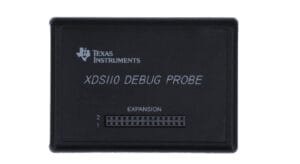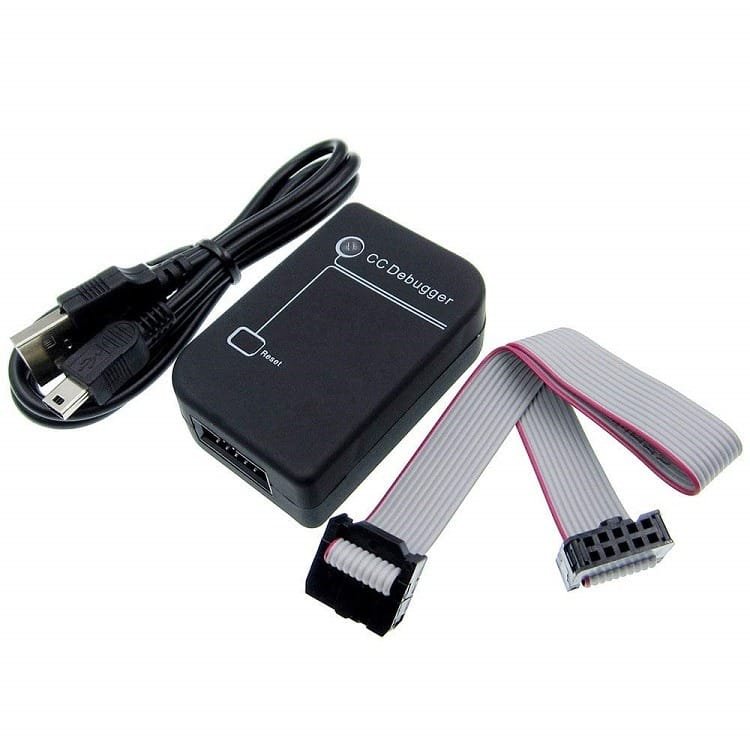Description:
The Texas Instruments XDS110 is a new class of debug probe (emulator) for TI embedded processors. The XDS110 replaces the XDS100 family while supporting a wider variety of standards (IEEE1149.1, IEEE1149.7, SWD) in a single pod. Also, all XDS debug probes support Core and System Trace in all Arm® and DSP processors that feature an Embedded Trace Buffer (ETB). For Core Trace over pins the XDS560v2 PRO TRACE is required.
The Texas Instruments XDS110 connects to the target board via a TI 20-pin connector (with multiple adapters for TI 14-pin and, Arm 10-pin and Arm 20-pin) and to the host PC via USB2.0 High Speed (480Mbps). It also features two additional connections: the Auxiliary 14-pin port connector that enables EnergyTrace™, a full duplex UART port and four General-Purpose I/Os, and the Expansion 30-pin connector to connect the XDS110 EnergyTrace HDR add-on.
If you are using Code Composer Studio™ you need to have version 7.0 or later.
The XDS110 comes in a package consisting of:
- XDS110 debug pod
- 20-pin debug cable
- 14-pin auxiliary cable
- TI 20-pin to TI 14-pin converter adapter
- TI 20-pin to Arm Cortex® 20-pin converter adapter
- TI 20-pin to Arm Cortex 10-pin converter adapter
- USB cable
- Breakout board for auxiliary cable
- Quick start guide
Devices NOT supported:
- MSP430™ microcontrollers
- Devices that include Arm®9 cores that use adaptive clocking
- AWR12x mmWave sensors
- C54x, C62x, C670x, C671x, C672x, C640x and C641x digital signal processors
- F24x/C24x microcontrollers
You will need:
- An installation of Code Composer Studio v7 (or later) or a compatible 3rd party development environment.
- A target board that features one of the compatible JTAG headers.
You may need:
- An adapter to allow connecting to target boards that features different JTAG headers
Shipping information:
- Product box dimensions: 260mm x 200mm x 50mm (10.0in x 8.0in x 2.0in)
- Packaged product weight: 240g (8.0oz)
Features:
The XDS110 is the latest entry level debug probe (emulators) for TI embedded processors. Designed to be a complete solution that delivers JTAG and SWD connectivity at a low cost, the XDS110 is the debug probe of choice for entry-level debugging of TI microcontrollers, processors and SimpleLink devices.
The XDS110 replaces the XDS100 technology and is the first debug probe that supports all TI devices with JTAG, cJTAG and SWD/SWO debug port in a single product. Also, both Core Processor and System Trace are available for all Arm and DSP devices that support Embedded Trace Buffer (ETB). For more information on the trace capabilities of a particular device please refer to its technical reference manual (TRM)
The XDS110 is also the first of the XDS family of debug probes to feature EnergyTrace for MSP432 and its add-on module XDS110 EnergyTrace HDR for SimpleLink wireless connectivity devices. EnergyTrace is a technology that allows measuring the true Energy and Power consumption of the target board and it can measure up to 75mA natively and up to 800mA with the add-on module. As an added flexibility, the same physical connection for EnergyTrace also features one UART port and four GPIOs for total hardware control.
The XDS110 is designed to replace the aging XDS100 family of JTAG debuggers with higher JTAG and cJTAG data throughput, added support for Arm Serial Wire debug modes at the same cost.
Following the trend for space reduction on modern TI development boards, the XDS110 features a standard TI 20-pin connector as the primary JTAG connectivity to the target. In addition to that, all variants feature modular target configuration adapters for TI and Arm standard JTAG headers (the offer of adapters varies per model).
The XDS110 family supports the traditional IEEE1149.1 (JTAG) as well as IEEE1149.7 (cJTAG) and Arm Serial Wire Debug (SWD)/Serial Wire Output (SWO) and operates with interface levels of +1.8V up to +3.6V.
IEEE1149.7 or Compact JTAG (cJTAG) is a major improvement over the traditional JTAG, as it supports all its features while using only two pins, and is available in selected TI wireless connectivity microcontrollers.
Serial Wire Debug (SWD) is a debug mode that uses two pins (JTAG uses four) and transfers data at a higher clock rate when compared to JTAG. Serial Wire Output (SWO) adds one more pin that allows performing simple Trace operations on selected Cortex M4 microcontrollers.
The XDS110 supports either USB2.0 Full Speed (11Mbps) or High Speed (480Mbps) connection to the host.
The XDS110 family is fully compatible with TI’s Code Composer Studio IDE. This combination gives a complete hardware development environment which includes an Integrated Debug Environment, Compiler, and full hardware debugging and Trace capability on selected TI microcontrollers, processors, and wireless connectivity microcontrollers.
Technical Documentation:
[woocs sd=1]


















Reviews
Clear filtersThere are no reviews yet.